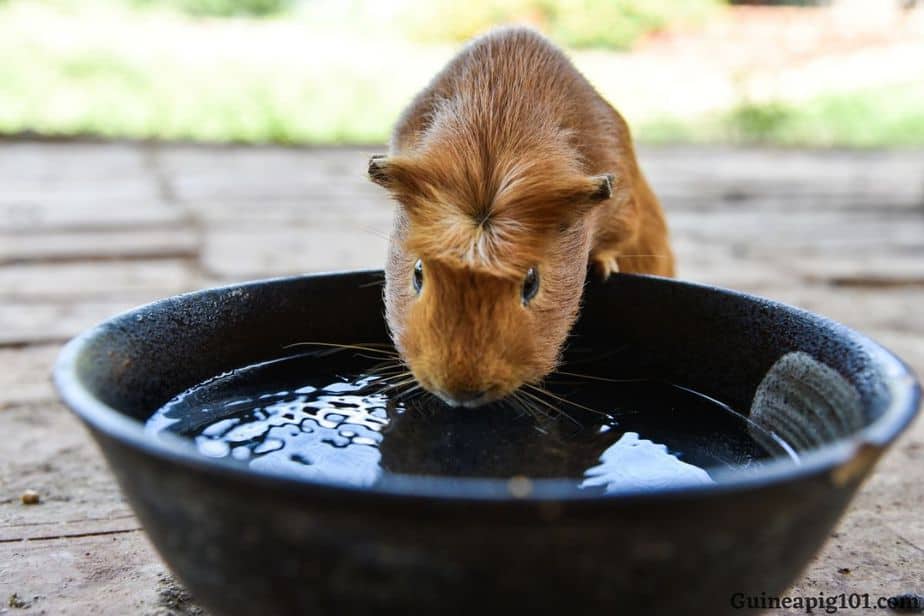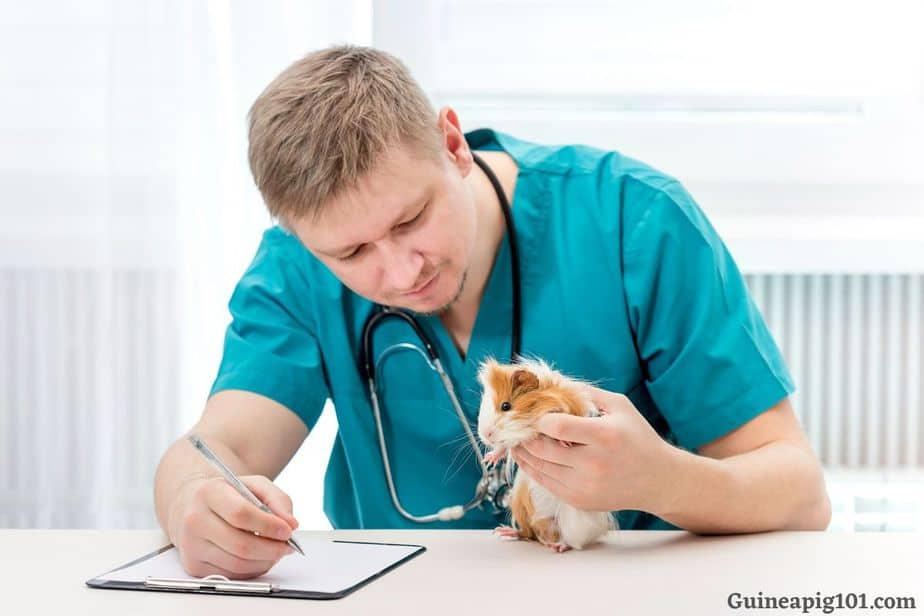A guinea pig not eating or drinking is at immediate risk always. Hydration is specifically crucial to your pet’s survival. Guinea pig’s health will deteriorate without regular access to fresh drinking water. But how long can guinea pigs go without water?
If your guinea pigs don’t have access to clean water for 12-24 hours, then their health can deteriorate quickly. If your guinea pig doesn’t drink for an extended period, then it may lead to severe dehydration and even organ failure in some cases. Anything above 24 hours is life-threatening for them.
An owner should make sure to take care by taking action on very first signs of dehydration, mainly in summers.
If your guinea pig is showing unwillingness to drink water, then you should find a reason behind it. There can be many reasons behind this.
Observing in a close manner will help you find the exact reason behind such kind of behavior.
They may not like the smell of the water, or there may be a problem with their bowl or bottle.
Dental issues can also be the reason. You must find the exact cause because water is essential for the survival of your guinea pig.
Do guinea pigs drink water?
Yes, guinea pigs need to drink water. Water is essential for all animals.
If your guinea pig is not drinking water regularly then it will place their life at risk.
A large percentage of a guinea pig’s body is made up of water. Drinking enough water is essential for several cellular functions:
- Water is essential as it maintains the thickness and rate of blood flowing in your guinea pig’s body. That ensures that your guinea pig’s organs continue to function in the best way.
- Water helps your guinea pigs body in the digestion process and to move food, at the end leading to elimination.
- Water also helps in flushing excessive calcium from your guinea pig’s blood. That prevents a lot of health issues including urinary tract infection, sludge, and bladder/kidney stones.
Dehydration is the obvious fret, in case your guinea pig is not drinking water. There are also possibilities for other issues.
Your guinea pig will find it hard to urinate and defecate, which will result in intestinal blockages. That will soon become a critical condition.
Guinea pigs know very well that hydration is very much necessary. There will be a reason behind your guinea pig, not drinking water.
How much water do guinea pigs drink a day?

On average, a healthy guinea pig can drink anywhere between 50-300 ml of water. The actual consumption may differ on a lot of factors. These includes:
- How old is your guinea pig? Young and growing guinea pigs are in more need of water than the older guinea pigs.
- How hot is the temperature? Guinea pigs need more water in summer than in winter.
- What is your guinea pig’s diet? If your guinea pig eats dry hay or pellets, they will need more water, and if they eat leafy greens, they will not need much water as they will obtain some dietary hydration.
- How energetic is your guinea pig? Keeping themselves hydrated is more crucial for guinea pigs who are running and doing exercise rather than a lazy guinea pig.
A healthy and happy guinea pig must drink 10% of their body weight in water. Your guinea pig should drink a minimum of 80-120ml of water every day if they weigh 800-1200 grams.
A cup of water in one day is more than enough to keep your guinea pig healthy and hydrated. Make sure to change the water regularly for the safety of your guinea pig.
You should always make sure that the bottle or bowl is topped up with water for them. Never let the bottle remain empty for more than a few hours a day.
How long can a guinea pig live without drinking?
A guinea pig can live up to 24 hours without water. This period reduces if the temperature is hot.
Water is very much necessary for your guinea pig, as not drinking water can result in a life-threatening condition of your guinea pig.
There is a massive difference between a guinea pig not drinking water at all for 24 hours and a guinea pig drinking some water in 24 hours.
This 24 hour period is for the guinea pig, not drinking water at all. A guinea pig drinking some water, but not enough, is not in immediate risk of danger.
However, You must still look into such a situation like this. A guinea pig not drinking enough water will become dehydrated soon.
If your guinea pig is unwilling to drink water, Find the reason behind it and resolve it. As not doing this will soon make your guinea pig unwell.
Also read: How long can you leave your guinea pigs alone?
Why does my guinea pig not drink water?
There can be many reasons for your guinea pig, not drinking water. That spans from the medical to the psychological. The following can be the reason for your guinea pig, not drinking water:
- The temperature of the water is incorrect: Your guinea pig is fond of drinking water, which matches the ambient temperature. Your guinea pig will show reluctance to drink water which is too hot or too cold.
- Your guinea has a dental problem: If your guinea pig is suffering from dental pain, they will not eat and drink, which will increase the pain. The professional vet should resolve this issue.
- The water bottle or bowl is unclean: Make sure you clean your guinea pig bowl or bottle on a regular basis. Your guinea pig will show an unwillingness to drink water in case their bowl or bottle is dirty.
- Your guinea pig gets hydrated from their food: Increased in the feeding of leafy greens may make them feel hydrated. You should take care of this. Only food does not provide enough water to your guinea pig.
- Your guinea pig is sick: Several types of illness cause guinea pig to reject water and food.
- The water smells or tastes different: Guinea pigs are animals that are hard to please. Your guinea pig will refuse to drink water that tastes or smells different. In such a case, change the water by refiling it.
It is not typical behavior of a guinea pig refusing to drink water. There may be a reason behind such behavior.
You should take this seriously, even in case they are just fussy. Such action can get your guinea pig in a life-threatening condition.
How can I stop my guinea pig’s water bottle from leaking?
One of the common problem that most guinea pig owner go through once in their lifetime is of a leaky bottle. But how can you fix that? Let’s find out!
- Take the water bottle out from the enclosure. Unscrew the lid counterclockwise, holding a water bottle with the drinking tube in an upward direction. Take out the lid from the water bottle and empty the remaining water from the bottle.
- Look closely at the rubber washer that takes place inside the lid where the tube enters. Take it out and bend it to if it is flexible or become dry and breakable. Change the washer, in case it has become breakable, or it has cracks. Your guinea pig water bottle will leak if the washer is damaged, as it will not be able to create an airtight seal. That will allow the water to leak from the seal or the feeder tube.
- Clean the inside of the tube by pushing a pipe cleaner through the tube and the metal ball placed inside it. You should make sure that there is no piece of food attached to the inside of the tube or the metal ball.
- Thoroughly clean the water bottle while it is apart. You should use a brush and water to clean the inside of the water bottle. An owner should make sure that the threads which join the bottle and lid are clear of any rubbish. Clean the outside of the water bottle and the drinking tube with a soft clean cloth.
- Fill the water bottle with fresh and clean water. Compress the bottle while you put the lid on if you have a plastic water bottle, as having a little vacuum inside helps stop dripping. Ensure that the cover is on securely after that reattach the water bottle to your guinea pig enclosure by turning the bottle upside down.
How can I keep my guinea pig water from freezing?
Frozen water is the most challenging factor during winter. Guinea pigs can survive well with cold temperatures. But water in their bottle may freeze in sub-zero temperatures that can lead to dehydration.
Usually, the bottle gets frozen in winter. That can result in the ice spreading and cracking the bottle. You should arrange a thermal case for winter if your guinea pig uses a bottle to drink.
You should use a dish or bowl in winter as a safety precaution. Using vessels with deep sides will help to prevent the contents from freezing and turning into ice.
You should make sure to prevent the water from becoming too cold. Guinea pigs are not very fond of drinking ice-cold water. They enjoy drinking lukewarm water during winter.
How long does it take for a guinea pig to dehydrate?
A Guinea pig can go for 24 hours without water. This period can be shortened, depending on the temperature.
During summer months all it takes is a few hours of water shortage and little to no veggies and your guinea pig is most likely to get dehydrated.
Guinea pig dehydration signs

The most instant and concerning result of a guinea pig, not drinking water, is dehydration. The owner must know about the signs of dehydration. Signs include:
- Foul-smelling urine: If your guinea pig is suffering from dehydration, then the ammonia scent will be much more noticeable. You will also notice darkness in the color of the urine.
- Loose skin: Pinch your guinea pigs fur around the neck in a very kind manner. If it doesn’t get back to its position quickly, then your guinea pig is dehydrated for sure.
- Lethargy and disorientation: Your guinea pig’s energy level will be affected because of dehydration. They may also become clumsy.
- Fever: Your guinea pig is in critical condition if they have a body temperature above 103 degrees Fahrenheit.
- Loss of appetite: Your guinea pig body will not function properly if they are not drinking water. They will not be very fond of eating as well. Not eating can be critical for your guinea pig.
Dehydration can make a life-threatening condition for your guinea pig.
Old, young, or unsafe pets are most at risk. If you detect that your guinea pig is dehydrated, then they need to be rehydrated immediately.
How to rehydrate a guinea pig?
It is critical to rehydrate your guinea pig, so you should take help from a vet in such a case. Providing a large bowl of water will not help your guinea pig to rehydrate.
The problem will not be solved even if your guinea pig laps it up. Rehydration is a slow and stable process. A most helpful solution is feeding your guinea pig with a syringe and intravenous fluids.
You can get a syringe from a pet store if you want to feed them with it. Fill the syringe with water and take it in the corner of your guinea pig’s mouth.
Make sure you are releasing water in small, controlled bursts. That will help your guinea pig to swallow and take rest between drinks.
If your guinea pig is showing unwillingness to drink or is not able to swallow, Immediately take your guinea pig to the vet.
Your guinea pig needs IV fluids. That is a very urgent situation, so make sure that your guinea pig is seen immediately.
How to get my guinea pig to drink more water?
If your guinea pig is showing unwillingness to drink water, then you should first fix this.
At first, your very first concern is to get some fluids into your guinea pig. The techniques to try are as follows:
- If your guinea pig is not drinking tap water, arrange bottled water or purify the tap water.
- Make your guinea pigs stream more engaging with tasty additions.
- Change water bowls to bottle, or vice versa.
- Make sure you clean all water vessels so there may not be an issue of smell.
If your guinea pig shows an unwillingness to drink, add some unsweetened fruit juice to their water. That will make them gain interest in the water again. Stop providing such juice as soon as they start drinking again.
However, don’t stop mixing the juice immediately after their first sip. Your guinea pig will again start showing unwillingness to drink water, holding out for the more juice.
Also, Make sure that you know exactly the difference between unsweetened and sugar-free juice.
The unsweetened one will include naturally-occurring sugars. These are guinea pig-safe when provided in small doses. Most Juices contain toxic artificial sweeteners, which are marketed as sugar-free juices.
Guinea pig water bowl or bottle
Water Bowl
| Advantages | Disadvantages |
|---|---|
| Your guinea pig can always see and access their water. | Many guinea pigs take water bowls as toys, hence they may throw their bowls around. |
| Drinking from a bowl allows guinea pigs to drink as much water as they want to, at their suitable speed. | The bowl of your guinea pig should be cleaned on a regular basis. Different bacteria and mold may grow if not being cleaned on a regular basis. |
| A bowl seems to be an instinct to your guinea pig’s life. As they would lap water from a stream or river in the wild. | Your guinea pig can drop hay or other food inside the bowl. Dropping hay or other food inside their bowl will make the water not usable in their eyes. |
| Bowls seem to be better for your guinea pigs neck. They will not have to twist themselves to reach their water. | If you are having more than one guinea pig, then they will empty the bowl very fast. In such cases, you have to make sure to fill their bowl regularly. |
Water Bottle
| Advantages | Disadvantages |
|---|---|
| Your guinea pig will only drink as much water as they want to drink by sipping from a bottle. | Chewing the end of a water bottle can result in hurting their teeth. |
| Most of the bottles release when your guinea pig licks the tip of the bottle. This minimizes the risk of spilling of water. | It is possible that your thirsty guinea pig may be irritated by drinking water from the bottle, as the bottle releases water slowly, a few drops at a time only. |
| Using a bottle will provide a last long supply of water in case multiple guinea pigs share an enclosure. A single guinea pig is not able to drink all the water or knock over the bottle. | Water bottles need to be close or do up securely to an enclosure. Your guinea pig has to reach to access it. |
| The water is less likely to freeze in cold weather, with the right safeguard. Invest in a thermal case for the bottle. | Water bottles are very tough to clean. Cleaning the bottle is very important to prevent the bottle from the risk of bacteria. |
Try both bowl and bottle, and watch which one your guinea pig prefers to drink.
Most guinea pigs have a fondness, one way or another. You can also offer both bottle and bowl to your guinea pig.
Teach guinea pig to use a water bottle
Your guinea pig may have never seen a water bottle before. It depends on their past experiences. A guinea found in a pet store will be fond of using a bottle, whereas a breeder may have used bowls.
For teaching your guinea pig how to drink from a bottle, entice them to try it. Put something attractive on the spout.
You can go for sweets as guinea pigs love sweet tastes, Sweet sugar-free jam will do the work (without xylitol). That will make your guinea pig lick the spout of the bottle.
Sooner your guinea pig will learn that this produces water. Continue keeping bowls in your guinea pigs enclosure until they get used to bottles.
Make sure you don’t provide treats to your guinea pig for too long, as they will expect it all the time once they get used to it.
Encourage your guinea pig to drink water regularly, and be aware if they stop drinking water. A Guinea pig will never remain thirsty for long. If they do, there will be an explanation behind this, which needs to be found.
Drinking water is even more condemnatory than eating food. Your guinea pig is in danger in case they avoid drinking water for more than 24 hours. Never let this thing reach this stage.
Sources: The Effects of Diet on Anatomy, Physiology, and Health in the Guinea Pig, Nutrient Requirements of the Guinea Pig, The physiological society, NCBI, Estimation of total body water, Secretion of electrolytes and water by the guinea pig
